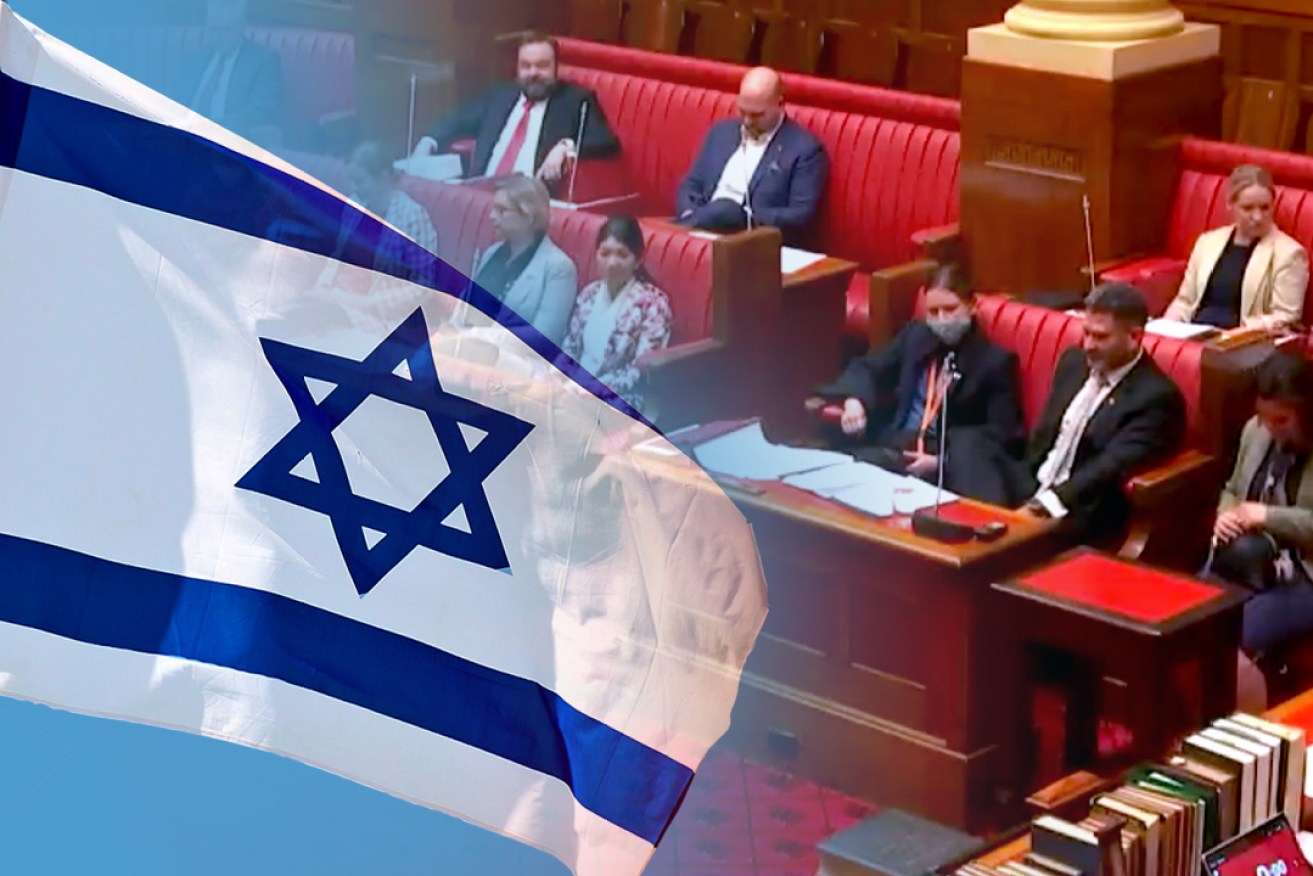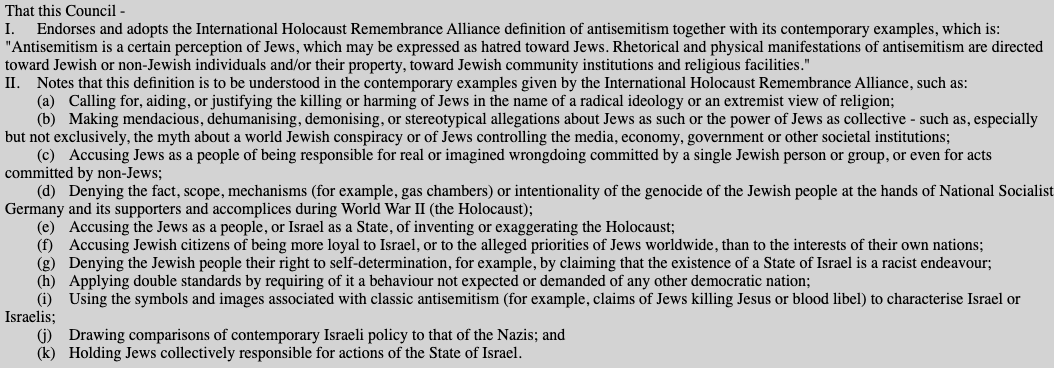Upper House recognises antisemitism definition
South Australia’s Legislative Council has adopted a contentious international definition of antisemitism, despite pushback from critics who say it’s intended to stifle criticism of Israel.


Image: Tom Aldahn/InDaily
The Upper House voted 15 to 4 on Thursday in favour of a motion from One Nation MLC Sarah Game asking that the Legislative Council “endorses and adopts the International Holocaust Remembrance Alliance (IHRA) definition of antisemitism together with its contemporary examples”.
The IHRA is an intergovernmental organisation with 35 member countries, including Australia. One of its core projects has been to draft a working definition of antisemitism to help “governments, organisations and individuals in their efforts to identify antisemitism”.
Labor and the Liberal Opposition voted to adopt the non-legally binding definition. The Greens and SA-Best voted against.
The IHRA definition states that “antisemitism is a certain perception of Jews, which may be expressed as hatred toward Jews”.
“Rhetorical and physical manifestations of antisemitism are directed toward Jewish or non-Jewish individuals and/or their property, toward Jewish community institutions and religious facilities,” it states.
But the motion also saw the Upper House formally recognise a series of contentious “contemporary examples” the IHRA says can be understood as antisemitism.
Seven of the 11 examples relate to the State of Israel, a country which has faced significant international criticism for its treatment of Palestinians through its blockade of the Gaza strip and expansion of Jewish settlements in the West Bank.
The IHRA’s contemporary antisemitism examples include:
- “Denying the Jewish people their right to self-determination, for example, by claiming that the existence of a State of Israel is a racist endeavour,
- “Applying double standards by requiring of [Israel] a behaviour not expected or demanded of any other democratic nation,
- “Drawing comparisons of contemporary Israeli policy to that of the Nazis,
- “Holding Jews collectively responsible for actions of the State of Israel.”
The other examples recognise antisemitism as promoting Holocaust denial, espousing myths of a world Jewish conspiracy, and “calling for, aiding, or justifying the killing or harming of Jews in the name of a radical ideology or an extremist view of religion”.
Critics of the definition, including one of its original drafters, say it is being “weaponised” by governments and right-wing Jewish groups to attack academic freedom and silence legitimate criticism of Israel.
The more widespread its adoption, the more likely people are fearful of criticising Israel – even if they have the facts behind them.
But One Nation’s Game rejected this argument, telling parliament there is an “obvious necessity for administrators and governments at all levels to have the framework in which to identify antisemitism here in South Australia”.
“It has always been made clear that legitimate criticism of Israel similar to that levelled against other countries cannot be considered antisemitic,” she said on Thursday night.
“It is in the explanatory notes of the IHRA definition. The conflation of endorsing this definition with the chilling of freedom of speech is untrue.
“Adopting this definition has never been about taking a side on international conflicts.”
Game – who has Jewish heritage but has previously told InDaily she is “not a practicing Jew at all” – said she brought the motion to the Upper House “because it’s the right thing to do, morally and ethically, and that’s been my only influence”.
She also thanked Dr David Adler, president of the conservative Australian Jewish Association, for “bringing this motion to my attention” along with Norman Schueler, immediate past president of the Jewish Community Council of SA, for his “support, advice and relentless advocacy in the community for the passing of this motion”.
“I want to note that this debate takes place in an atmosphere of rising antisemitism around the world,” Game said.
“The Anti-Defamation League, which collects and collates antisemitic incidents in the United States, recorded a record high in 2021.
“The hesitation and in some cases, refusal from other parties to support this motion has been confusing, disappointing, especially considering the six million Jews murdered in the Holocaust.”
Adopting this definition has never been about taking a side on international conflicts.
The motion’s passage comes despite a campaign from the Australian Friends of Palestine Association (AFOPA) urging MPs to vote against the motion.
AFOPA executive committee member Mike Khizam said the IHRA definition was about “creating an identification in people’s minds between criticism of Israel and antisemitism”.
“It’s designed to, in our view, stifle free speech at the very same time that Israel is increasingly being recognised as an apartheid state,” Khizam said.

A full copy of the antisemitism definition adopted by the Legislative Council on Thursday, July 7, 2022.
“Just the motion itself has a chilling effect, but there have been cases, particularly in the US, with a number of universities where they’ve been investigated for antisemitism on the basis of criticism of Israel.
“The more widespread its adoption, the more likely people are fearful of criticising Israel – even if they have the facts behind them.”
AFOPA’s advocacy appeared not to sway the Labor Government’s final position, with the ruling party voting against a push from SA-Best to amend Game’s motion.
The amendments would have replaced the IHRA definition with a statement that the Legislative Council “rejects antisemitism and all forms of racial or religious discrimination” as well as:
- “recognises the centrality of freedom of speech to Australian democracy, and that civil discourse is essential to preserve freedom of speech,
- “acknowledges the right of all Australians to advocate and organise on behalf of causes both foreign and domestic in freedom and without fear,
- “supports the right of both Israelis and Palestinians to live in equality, peace and security in Israel and Palestine.”
The Opposition joined Labor to vote down Bonaros’ amendments. Game said it would have “butchered” the intent of passing the IHRA’s definition.
SA-Best MLC Bonaros said her inbox had “suddenly become flooded” with concerns from members of the public after Game’s antisemitism motion was first introduced.
She said she couldn’t support endorsing the IHRA definition “despite any good intentions”, citing freedom of expression concerns raised by “academics, legal experts and human rights groups all over the globe”.
“I cannot in the face of all the concerns that have been raised with us … support this motion,” she told parliament.
“It is imprecise, it is confusing … and it conflates issues that ought not be conflated unnecessarily.”
Labor MLC Emily Bourke, however, said “any measure that can help to fight against prejudice … should be carefully considered”.
“On our side of the chamber, we are understanding and appreciative of this sincere intent of [Game’s] motion,” she said.
“I understand that this definition has been recognised and endorsed in a number of other jurisdictions including interstate.
“I agree that a definition of antisemitism will have value in governments and individuals being able to identify and respond to antisemitic behaviours in our communities.”
The IHRA lists 35 countries, including Australia, as having endorsed their working definition for antisemitism, although not all countries have adopted the contemporary examples.
The Morrison Government formally endorsed the definition in October 2021. New Prime Minister Anthony Albanese has indicated the Labor Party will not change the previous government’s position.
The Victorian and NSW governments have also adopted the IHRA’s definition.
Norman Schueler, immediate past president of the Jewish Community Council of South Australia. welcomed the motion’s passing through the SA’s Upper House.
“We are truly glad that South Australia has joined the mainstream … many countries and organisations – including arms of the United Nations – to come on board with the definition of antisemitism,” he said.
“Antisemitic comments around the world, even here in Adelaide, have been on the rise steadily over the last few years.
“This sort of clears the air to a certain extent of how you define antisemitism.”
Schueler rejected criticisms that the motion could stifle criticisms of Israel.
“It’s quite obvious in the act that any criticism, for instance, of Israel that could normally be levelled at another country is okay,” he said.
“Freedom of speech is paramount to us.”
Khizam from AFOPA said after the motion’s passing that Labor’s support was a “setback for both free speech and the right to fight for human rights”.
Game’s antisemitism definition motion is not expected to be carried in South Australis’s Lower House.
The One Nation MLC has also introduced a Bill to ban the display of Nazi symbols in public. That legislation is set for debate when parliament returns in September.




